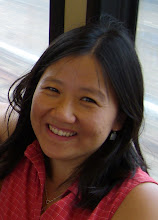Wednesday, December 2, 2009
Be Creative -- and see systems, not isolated events
Tuesday, October 27, 2009
Walking in the dark on a raining day
- I don't have to spend time going to the gym. That decreases my carbon footprint and increases the time I can do other things -- like volunteer at our schools and for my county.
- I feel a connection to nature and hence, have improved spiritual health as well as physical health.
- I get to talk to my children one-on-one as I walk each to a different bus stop each morning (one is in high school and the other is in middle school).
- I get to see more of my neighbors, bringing about a greater sense of community.
- I get to rescue the worms that end up on the sidewalks during rain
Friday, August 28, 2009
Finding Common Ground
Sunday, June 14, 2009
Sharing resources from those who have more than enough with those who have too little

 Where we are born is an accident of life. Hence, I feel very blessed that I was born into a family that had the ability to get out of a poor situation (Rangoon, Burma) and born with a healthy body and decent brain functions. I have felt guilt for portions of my life about the fact that so many people have so little and I have so much.
Where we are born is an accident of life. Hence, I feel very blessed that I was born into a family that had the ability to get out of a poor situation (Rangoon, Burma) and born with a healthy body and decent brain functions. I have felt guilt for portions of my life about the fact that so many people have so little and I have so much. But we must do more than throw money at the problem of inequality – it has to be done with behavioral changes and with great heart. One organization that has had great success in breaking the poverty-high fertility cycle is Grupo Primavera, a Brazilian Charity that began by taking poor young girls in (in the spring of their lives as primavera means spring), feeding them, and educating them with skills they can use to become independent women. Organizations like Grupo Primavera breaks the cycle of poverty-and-population increases by empowering women with better lives, and enabling women to have smaller, more stable families they can take care of. One of the American women who were involved with Grupo Primavera, Judy, came back to the U.S. and began Educating Latin American Adolescents, Inc. (http://educatinglatinamerica.org/default.aspx) in order to continue to support such a great organization as Grupo Primavera. The creation of Educating Latin American Adolescents allowed Judy to sell the crafts (such as dolls and cross-stitched cards) that the girls make and send the money back to empower the girls to achieve more.
I met Judy at a craft store about seven years ago, and supported Grupo Primavera by buying their great cards and dolls the girls make, and then when I had enough cards and dolls as presents after several years, we discussed other options, and settled on the most effective method of contribution as money. One of the ways we contributed money was to write a check for each of our two children’s birthdays to this wonderful organization, and ask others to contribute in lieu of a present. We have had four birthday parties for our girls, asking that people contribute to Educating Latin America Adolescents, Inc./Grupo Primavera in place of presents. I had hoped that others would want to do the same after learning about such great organizations (there are other worthy organizations as well). A few parents have commented how wonderful an idea it is, but I have yet to see birthday parties as fundraisers for charities catch on.
It seems to me that a sense of something larger than ourselves must be part of solutions that begets solutions. This is just one idea on how to be part of a larger whole.
The pictures above are those of the slums of Brazil and of my youngest daughter’s birthday party used to raise money for the children who live in such slums.
Wednesday, May 27, 2009
Minimize labels
Friday, April 24, 2009
People, Planet, and Prosperity

The month of April was spent working on preparing a final report for our EPA "People, Planet, and Prosperity" project and preparing to take seven UMUC to EPA's National Sustainability Design Expo at the National Mall from April 18-20. The picture on the right shows six of my students in front of our poster at the EPA Expo.
Saturday, March 28, 2009
Walking with your children
Wednesday, February 25, 2009
Solutions that beget Solutions
 So many people I have talked to have felt overwhelmed by all the problems they hear about -- habitat destruction, poverty, wars, drugs, species extinction, floods, and so on. We can feel helpless as individuals -- or we can begin with small steps towards solutions that beget solutions.
So many people I have talked to have felt overwhelmed by all the problems they hear about -- habitat destruction, poverty, wars, drugs, species extinction, floods, and so on. We can feel helpless as individuals -- or we can begin with small steps towards solutions that beget solutions.None of us can truly work toward any sustainable solutions without first feeling good about ourselves. To me, solutions that beget solutions do help us feel good about ourselves, physically, mentally, and spiritually. If you want to be part of something bigger than yourself, then please join in this discussion!
